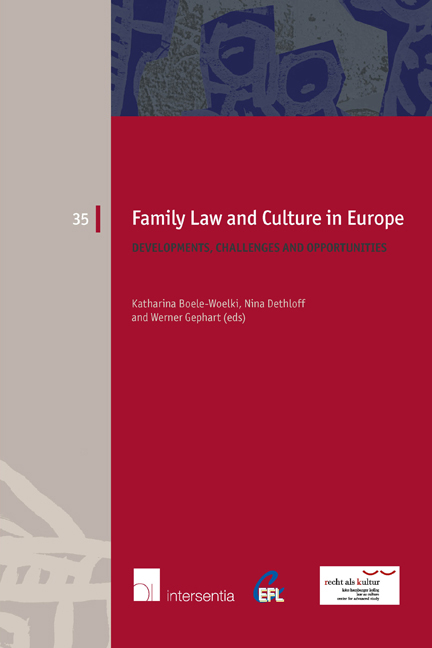Book contents
- Frontmatter
- Preface
- Contents
- List of Authors
- PART ONE THE CEFL PRINCIPLES ON PROPERTY RELATIONS BETWEEN SPOUSES
- PART TWO BREAKUP OF (NON-)FORMALISED RELATIONSHIPS
- PART THREE NEW CONCEPTS OF PARENTAGE
- PART FOUR INTERNATIONAL FAMILY RELATIONSHIPS
- PART FIVE TRANSNATIONAL FAMILIES: ACROSS NATIONS AND CULTURES
- Family Life and EU Citizenship: The Discovery of the Substance of the EU Citizen's Rights and its Genuine Enjoyment
- Private and Family Life versus Morals and Tradition in the Case Law of the ECtHR
- Real-Life International Family Law: Belgian Empirical Research on Cross-Border Family Law
- Transnational Family Relations Involving Moroccan Nationals Living Abroad: An Analysis of the Implementation of the Moroccan Family Code Brief report on research in progress
- Family Law as Culture
- EUROPEAN FAMILY LAW SERIES
Real-Life International Family Law: Belgian Empirical Research on Cross-Border Family Law
from PART FIVE - TRANSNATIONAL FAMILIES: ACROSS NATIONS AND CULTURES
Published online by Cambridge University Press: 22 November 2017
- Frontmatter
- Preface
- Contents
- List of Authors
- PART ONE THE CEFL PRINCIPLES ON PROPERTY RELATIONS BETWEEN SPOUSES
- PART TWO BREAKUP OF (NON-)FORMALISED RELATIONSHIPS
- PART THREE NEW CONCEPTS OF PARENTAGE
- PART FOUR INTERNATIONAL FAMILY RELATIONSHIPS
- PART FIVE TRANSNATIONAL FAMILIES: ACROSS NATIONS AND CULTURES
- Family Life and EU Citizenship: The Discovery of the Substance of the EU Citizen's Rights and its Genuine Enjoyment
- Private and Family Life versus Morals and Tradition in the Case Law of the ECtHR
- Real-Life International Family Law: Belgian Empirical Research on Cross-Border Family Law
- Transnational Family Relations Involving Moroccan Nationals Living Abroad: An Analysis of the Implementation of the Moroccan Family Code Brief report on research in progress
- Family Law as Culture
- EUROPEAN FAMILY LAW SERIES
Summary
INTRODUCTION
In 2004 Belgium codified its private international law. This Code of Private International Law (PIL Code) encompasses the three pillars of private international law: (1) rules on international jurisdiction, (2) rules on the applicable law, and (3) rules on the recognition and enforcement in Belgium of foreign judgments and authentic acts.
With support from the Flanders Research Foundation (FWO-Vlaanderen), I conducted research into the concrete application of the PIL Code in the field of family law. I examined whether or not the objectives set out by the Belgian legislator have been achieved in practice and whether or not the Belgian PIL Code is a sufficiently adequate instrument to deal with ‘real-life’ international family law matters. For this study I had access to a vast amount of empirical sources which offered a clear picture of how courts and (local) authorities apply the PIL rules.
My field-test research revealed several discrepancies between the legislative ambitions and the practice of the courts and administrations, some of which can be attributed to the context within which private international law functions. At the national level, for instance, migration policy exerts considerable pressure on international family law. The research demonstrates a true instrumentalisation of private international law by migration (law) policies, leading, amongst other things, to all kinds of limping family law relationships (limping names, limping fatherhoods, limping marriages and divorces, etc.).
This contribution first outlines the empirical research method (section 2) and briefly illustrates the added value of empirical research in legal studies (section 3). It then reflects a few of the research findings: the nexus between private international law and migration law and their different normative approaches to identical family situations (section 4.1) and the issue of party autonomy which is not used though possible in certain fields of family law and not possible though useful in other areas of family law (section 4.2).
EMPIRICAL RESEARCH IN THE FIELD OF PRIVATE INTERNATIONAL LAW
The research was divided into two consecutive phases. Firstly, I focused on the objectives and choices of the Belgian legislator in drafting the PIL Code provisions in the field of family law. In a second phase these legislative objectives were compared to the actual practice of judicial and administrative authorities.
- Type
- Chapter
- Information
- Family Law and Culture in EuropeDevelopments, Challenges and Opportunities, pp. 323 - 334Publisher: IntersentiaPrint publication year: 2014



